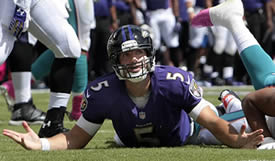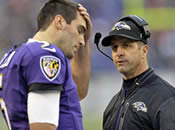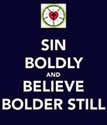
My morning devotional time usually includes a Dietrich Bonhoeffer reading/mediation. Last fall, one jolted me wide awake. SIN BOLDLY! the title blurted. October 18th selection from A Year with Dietrich Bonhoeffer (Daily Meditations from His Letter, Writings, and Sermons © 2005, HarperOne, edited by Carla Barnhill. I read on with anticipation.
I learned that Sin Boldly was a statement by Martin Luther. (A Lutheran saying to sin?!) But, any hopes for perhaps divine instruction to just go out and do it all faded when I found that the statement was not meant to be a beginning -- that is, to go out and sin -- but exclusively as an end, the very last word. As Bonhoeffer explained it:
"Sin Boldly could be for Luther only the very last bit of pastoral advice, of consolation for those who along the path of discipleship have come to know that they cannot become sin-free. ... Sin Boldly is not something like a fundamental affirmation of their disobedient lives. Rather, it is the gospel of God's grace, in the presence of which we are sinners always and at every place."Ibid.
The next day's meditation was "Believe Boldly." This selection went further to say that the Sin Boldly statement
can be heard without threatening one's faith by those who are called to follow Christ and understand the nature of God's grace. We are
"Being a Christian is less about cautiously avoiding sin than about courageously and actively doing God's will."
Dietrich Bonhoeffer
sinners and we will continue to sin; not that sin is our goal, but we cannot avoid it. However as a concluding statement,
we can Believe Boldly that God's grace provides forgiveness. Luther's last part in the full statement is the admonition to let our
trust in Christ be stronger than the sins we commit.
I suppose it's something like: "The only way we can hope to live sin free is to do nothing." But, I guess, too, there's a Catch-22 in that approach: We're then guilty of sins of omission!
As they often do, my thoughts moved to sports, and a time in high school football where I played outside linebacker. My coach taught us, when deciding whether to blitz the quarterback, to "read the keys." If you interpreted the keys to mean you should blitz, go for it! But, most meaningful, I remember his follow-up words, "If you realized you've made a mistake and shouldn't have blitzed, don't stop and back up. Keep going! You just might make something happen. If you try to back up, you'll be in no-man's land and not be of use to anyone." Sounds a bit like Sin Boldly!
Importantly though, I realized that I could play aggressively because I knew the coach wouldn't chew me out because of my error in judgment. He might admonish me for failing to know the keys; but, never for my ill-timed blitz. His teaching and his grace of forgiveness gave me freedom to play at 100 percent. (And I hear the voice of that "preacher" I sometimes hear inside my head with a message about God's Word, God's Law, God's Grace, and God's Forgiveness, and how those are all wrapped as one.)

Joe Flacco, quarterback of the NFL's Baltimore Ravens, is known for making plays that seem above his ability. This trait contributed to his being named Most Valuable Player of the 2013 Super Bowl in the Ravens victory over the San Francisco Forty-Niners. Flacco's college coach at the University of Delaware, K.C. Keeler, once asked Joe what he thought made him a great quarterback. "Flacco thought about it," Keeler reports, but not for long. "I'm not afraid to fail," Flacco told Keeler. Washington Post, January 19, 2013 by Barry Svrluga. Not afraid to fail. Sin Boldly! Luther says.
But again, as in my high school story, a coach makes Flacco's lack of fear of failure possible. Ravens coach John Harbaugh
 taught Flacco well; but probably more importantly, Flacco knew that Harbaugh would understand and forgive his trying to make
something happen. How often do we see people (maybe ourselves) not take the risk to act boldly because of fear of failure? And not only fear because of
the actual mistake, but of how our error will be judged by others, our boss, our parent, our church.
taught Flacco well; but probably more importantly, Flacco knew that Harbaugh would understand and forgive his trying to make
something happen. How often do we see people (maybe ourselves) not take the risk to act boldly because of fear of failure? And not only fear because of
the actual mistake, but of how our error will be judged by others, our boss, our parent, our church.
God gives us freedom. And, in relationship with Christ who experiences our humanity and sacrificed his life for our sake, we can know a sense of a real freedom that trusts in God's grace. We do need to be people of faith who examine ourselves, recognize our sin, and are truly sorrowful. But without this critical balance of striving to follow God's law and yet trusting in God's grace, our fear of sin can leave us impotent to really do anything. We can become people who seem to wallow in the knowledge of their sinful nature, rarely uplifting themselves or anyone else, wearing their awareness of their sin as a badge of sincerity.
 To keep our
balance perhaps we need to internalize the deep awareness of the psalmists who in their writings, "love the Lord's teachings, and they think
about those teachings day and night" (Psalm 1:2 NAS), but also know that "The
LORD is compassionate and gracious, slow to anger, abounding in love." (Psalm 103:8 NIV)
To keep our
balance perhaps we need to internalize the deep awareness of the psalmists who in their writings, "love the Lord's teachings, and they think
about those teachings day and night" (Psalm 1:2 NAS), but also know that "The
LORD is compassionate and gracious, slow to anger, abounding in love." (Psalm 103:8 NIV)
Now, does any of this mean that we should just go out and sin away? Plan to sin, trusting that God will forgive us anyway? (See Romans 6:1-2.) The answer is a resounding NO! Such thoughts are a distortion of Luther's Sin Boldly meaning. We should no more try to sin than Joe Flacco would try to throw an interception; no more than the all-pro would fail to study the films to learn to read the keys! No more than I would have tried to foul up and blitz at the wrong time.
We are free! Not free, however, to just do what we want, not free be ignorant of or ignore God's laws; but free to do God's will. When we internalize this, it is good news indeed!
It seems, though, there is more to all this. I do feel a healthy and legitimate freedom realizing God's mercy regarding my sinful nature. But, something sounds too formula-like: 1) realize I will sin, 2) know God forgives, 3) get on with life. I guess it can be as deep or shallow an understanding as we make it. Also, even given the caution of St. Paul (we shouldn't sin just to get more mercy), something still seems a bit flippant. Perhaps it feels this way because the examples I used place the sin-doing when acting in the heat of the moment, when acting on-the-fly. I sense Luther's Sin Boldly encompasses something even deeper. How does it come into play when I sin knowing exactly what I'm doing, when I fully understand my course of action will violate God's laws?
I plan to reflect further on these aspects of Sin Boldly in Part II of this Reflection. For now though, I close with this from the Book of Common Prayer's earlier Rite I of the Eucharist liturgy: "If any man sin, we have an Advocate with the Father, Jesus Christ the righteous ..."(page 332, and 1 John 2:1-3)





